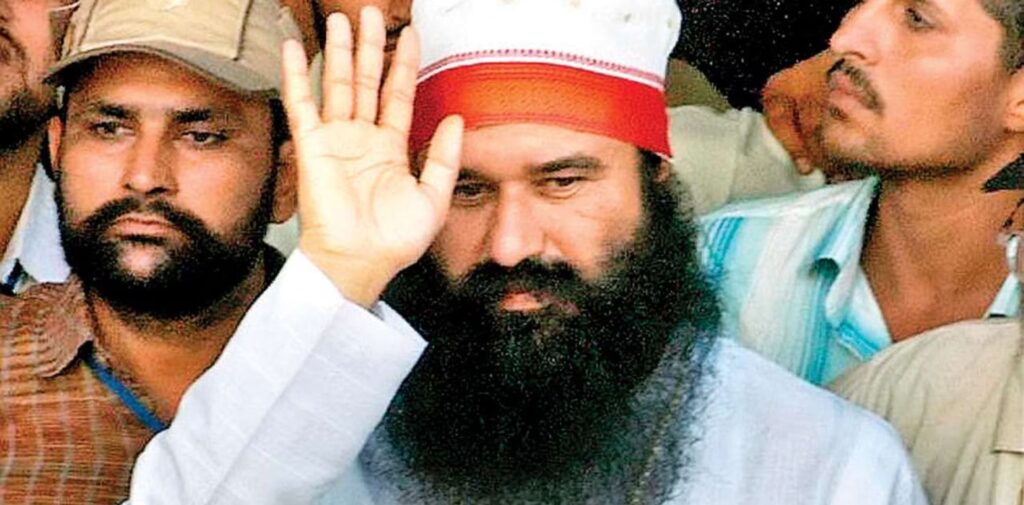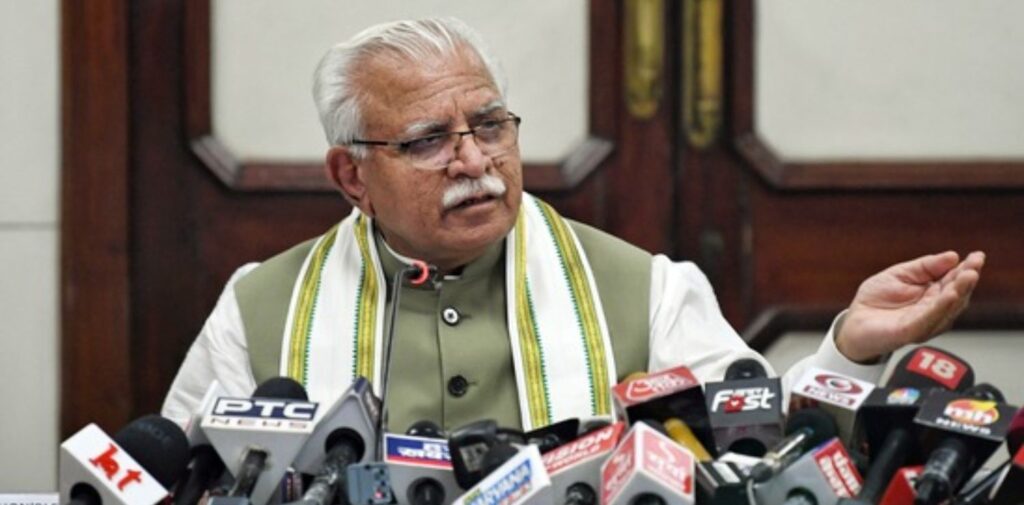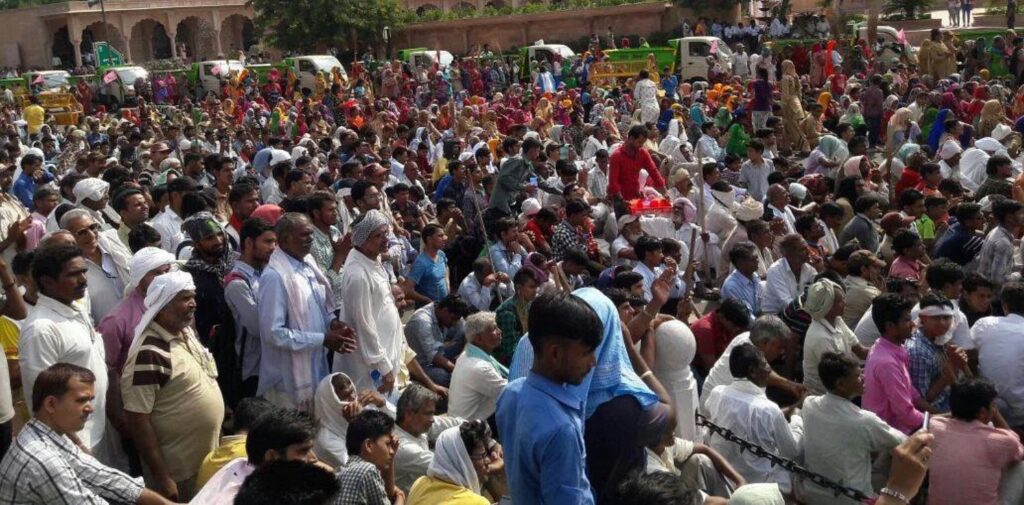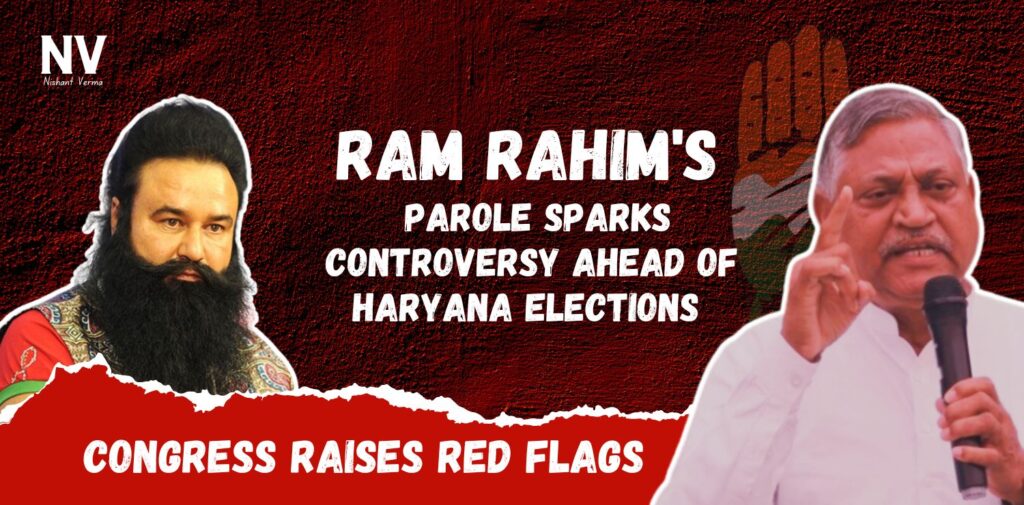In a move that has stirred political controversy, the recent parole granted to Gurmeet Ram Rahim Singh, the Dera Sacha Sauda chief and a convicted rapist and murderer, has raised eyebrows in Haryana’s political circles. The Congress has sounded a warning, alleging that the Bharatiya Janata Party (BJP) is using Ram Rahim’s influence for electoral gains ahead of the upcoming state elections. This article delves into the details of the parole, the reactions from political parties, and the potential impact on the electoral landscape in Haryana.
Ram Rahim’s Parole and its Timing: A Strategic Maneuver?
Gurmeet Ram Rahim Singh, serving a 20-year sentence for rape and murder, was recently granted a 40-day parole for the 10th time in the last three years. While parole is a legal right of prisoners under certain conditions, the timing of Ram Rahim’s release has sparked a political storm. With the Haryana elections just around the corner, the Congress and other opposition parties have alleged that the parole is a calculated move by the ruling BJP to influence voters, particularly those who are loyal followers of the Dera Sacha Sauda sect.

The Dera Sacha Sauda, which has a significant following in Haryana and Punjab, is known to wield considerable influence over its devotees, who have historically voted as a bloc. During past elections, the sect has thrown its support behind political parties, significantly impacting election outcomes in several constituencies. The Congress has been vocal in its criticism, suggesting that the parole is an attempt by the BJP to secure the Dera vote bank, thus undermining the integrity of the electoral process.
Congress’ Criticism: An Unholy Alliance?
The Congress has labeled the parole as an example of the BJP’s “unholy alliance” with convicted criminals and has questioned the Haryana government’s motives behind the repeated release of Ram Rahim. Haryana Congress President, Udai Bhan, stated that the parole is a blatant misuse of power by the BJP, accusing them of manipulating legal procedures for political gains.
“Why is the Haryana government so lenient with a convict who has been sentenced for heinous crimes?” asked Bhan in a press conference. “This is not the first time Ram Rahim’s Parole has been granted ,every time it has happened before elections. What message are we sending to the people of Haryana and the judiciary?”
The Congress has also raised concerns about the legality and ethicality of granting parole to a high-profile convict like Ram Rahim, especially given the nature of his crimes and the impact of his release on the families of his victims. Several political leaders have demanded that the Election Commission take note of the situation and ensure that the electoral process is not compromised.
BJP’s Defense: Just Following the Rules
The BJP, on the other hand, has dismissed the Congress’ allegations as baseless. Senior BJP leaders have claimed that the parole was granted in accordance with the jail manual and existing legal provisions. They have argued that Ram Rahim’s release is not linked to the upcoming elections and that the timing is purely coincidental.
Haryana Chief Minister Manohar Lal Khattar, in response to the allegations, stated, “The decision to grant Ram Rahim’s Parole is made by the competent authorities based on the prisoner’s behavior and legal criteria. It has nothing to do with the elections. The Congress is trying to politicize an administrative decision for their own electoral benefit.”

However, the opposition remains unconvinced. They point to the fact that the Dera chief’s paroles and furloughs have often coincided with elections in the region, which raises suspicions about the motivations behind these decisions.
Impact on the Electoral Landscape
The Dera Sacha Sauda’s influence in Haryana is undeniable, and political parties have traditionally courted the sect for support. During the 2014 and 2019 Haryana Assembly elections, the Dera’s support was seen as a key factor in swaying votes in favor of the BJP in several constituencies. With Ram Rahim out on parole, there is speculation that he could mobilize his followers once again, either directly or indirectly, to support the BJP.

For the Congress, the challenge lies in countering this influence and ensuring that the elections are fought on issues rather than sectarian loyalties. The party has called on the Election Commission to monitor the situation closely and take action if there is evidence of electoral manipulation.
Political analysts believe that the parole could be a double-edged sword for the BJP. While it may help consolidate votes from Dera followers, it could also alienate other segments of the electorate who are against the release of a convicted criminal. The BJP’s opponents are likely to use the parole as an election issue, portraying the ruling party as complicit in undermining the law for political gains.
Voices of Dissent: Families of Victims React
The families of Ram Rahim’s victims have expressed anguish over the repeated paroles granted to him. They argue that his release sends a wrong message and undermines the gravity of his crimes. “How can a convict who has not completed even half of his sentence be allowed to walk free time and again?” questioned a family member of one of the victims.
The parole has also drawn criticism from civil society groups, who view it as a case of preferential treatment given to influential prisoners. They have urged the judiciary to intervene and review the parole system to prevent misuse.
Conclusion: A Test for Democracy
The issue of Ram Rahim’s parole ahead of the Haryana elections is more than just a political controversy. It is a test for the democratic process, the legal system, and the integrity of electoral institutions. While the BJP defends the parole as a legal right, the Congress and other opposition parties view it as a manipulation of the electoral process.
As Haryana heads to the polls, the parole issue is set to be a flashpoint in the political narrative. The Election Commission’s stance and the reactions of the voters will determine whether this controversy sways the outcome of the elections or if it becomes yet another chapter in the complex relationship between politics and sectarian influence in Indian democracy.




